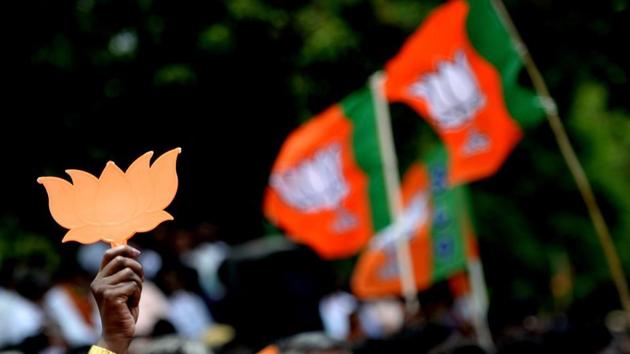In the quest for power, the ethical decline of the BJP | Opinion
The party is willing to use all instruments for absolute dominance, becoming another Congress in the process
In Indian politics, where you stand depends on where you sit. The latest instance of this truism is provided by the genial Rajasthan governor, Kalraj Mishra. In 1998, Mishra was part of a Bharatiya Janata Party (BJP) dharna to protest the dismissal of the Kalyan Singh government in Uttar Pradesh (UP) by the then governor Romesh Bhandari. This time, it was the Congress Members of Legislative Assembly (MLAs) who staged a sit-in protest on the lawns of the Jaipur Raj Bhavan against Mishra’s refusal to call an urgent assembly session as had been demanded by Rajasthan chief minister (CM) Ashok Gehlot. The governor has now prevailed on the need for a 21-day notice period for convening the House, which provides enough time for horse-trading of MLAs. Clearly, Mishra’s primary allegiance seems to be to the Centre and not the Constitution.

Mishra is not the only governor in recent times to court controversy. In 2017, Mridula Sinha in Goa and Najma Heptullah in Manipur hurriedly swore in BJP-led governments even though the party was not the single largest in the Assembly. In 2018 in Karnataka, Vajubhai Vala, a former Gujarat BJP president, invited BS Yediyurappa to form the government even though he didn’t have the numbers: The government fell in 48 hours after Supreme Court (SC) intervened. In 2019 in Maharashtra, BS Koshiyari had a crack of dawn swearing-in for Devendra Fadnavis; the CM resigned in a week. What unites them is their status as veteran 75-plus BJP margdarshak mandal politicians.
The best defence offered for the partisan actions of these constitutional authorities is to engage in whataboutery by claiming that they are only following the hoary traditions set by the Congress. In a sense, this is further proof of the creeping Congressification of the BJP in the Modi-Shah era, of how a self-proclaimed party with a difference is now a party of absolute power. The much-hyped tagline of being different was not just about providing a political alternative to the Congress, but also an alternative political culture. The value-based politics that the Vajpayee-Advani generation claimed to represent has been replaced by the politics of high value, with a price tag attached.
Take, for example, the Enforcement Directorate (ED) summons to Gehlot’s brother in an alleged fertiliser scam case that dates back to 2007. ED is often accused of being the BJP’s closest ally, a preferred weapon of political vendetta, used to harass and intimidate rivals. That a decade-old case is revived in the midst of political turmoil in Rajasthan is no coincidence. Here, too, the counter-argument rests on the Congress’ deeply flawed track record of exploiting State agencies. But then if the Central Bureau of Investigation (CBI) was a caged parrot in the Congress-ruled times, must ED become a rottweiler in a BJP regime?
Examine also the allegations of large sums of money being offered to switch sides in Rajasthan. Even if the amounts cited are largely conjecture, the lure of ministerial perks is an undeniable cause for defections. As the BJP has journeyed from being a party of opposition to a party of power, its idealism and ideology lie compromised in the quest for total supremacy. A growing number of the BJP “conquests” are actually of former Congresspersons who have gone with the saffron wind. Manipur’s CM N Biren Singh was a Congressman for over a decade before joining the BJP. Goa’s deputy CM, Chandrakant Kavlekar, won four consecutive terms as a Congress MLA before joining the BJP. The Karnataka Cabinet has at least 10 ministers who were once in the Congress. Half the ministers in the Shivraj Singh Chouhan government in Madhya Pradesh were formerly with the Congress. Assam’s all-powerful minister, Himanta Biswa Sarma was a long-serving Congressman. The list is a long one.
At one level, this suggests an implosion within the Congress, a stark reflection of a party in disarray with a weakened leadership unable to stem the outflow. But at another level, it exposes a predatory instinct within the new BJP that seeks to use every conceivable opportunity to decimate its opponents. In the process, the BJP’s once highly-disciplined party structure now risks ideological incoherence: When you reward opportunism and downgrade ethical behaviour, you create potential flashpoints for the future. Even the once considerable moral authority, vested in the Rashtriya Swayamsevak Sangh (RSS) sarsanghchalak, is now secondary to the dominance of the political executive in the Modi-Shah era.
Moreover, the institutional takeover is now almost complete. An election commissioner who dissents is packed off to an insignificant posting in Manila. An SC chief justice is nominated to the Rajya Sabha within months of retirement, while a sitting judge hails the prime minister as a “versatile genius”. Parliament is reduced to a notice board as exemplified during the scrapping of Article 370. And a large section of the media performs the role of unabashed cheerleader. Meanwhile, the BJP’s footprint continues to expand: Madhya Pradesh only yesterday, Rajasthan maybe today, who knows which Opposition-ruled state tomorrow. Is there any space left for systemic checks and balances?
Post-script: The opulent Raj Bhavans across the country are mostly colonial relics, grand buildings that are maintained at great expense with taxpayers’ money. Do we really need this imperial grandeur when governors are being used by the Centre to engage in blatant power play? Here is a better idea: Why not convert these majestic mansions into Covid-19 care centres?
Rajdeep Sardesai is senior journalist and author His latest book is 2019: How Modi Won India
The views expressed are personal






